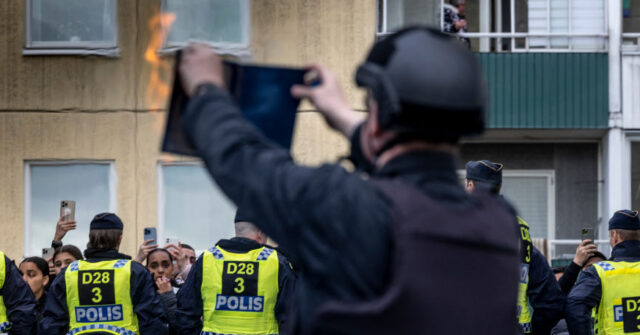Top News
Sweden May Bow to Turkey’s Demand it Enact Blasphemy Law In Exchange for NATO Membership

Sweden may strike out its freedom of expression protections to ban Qur’an burning, a protest form that has angered Turkey and which is being required to be prohibited by the Erdoğan government in return for admitting Sweden into NATO.
Sweden’s justice minister has said he is considering changing the law to remove freedom of expression protections for certain acts, specifically the burning of Islamic holy book the Qur’an, but that the government has not yet made up its mind. The act has emerged as a form of protest in some European nations, but also as a practical demonstration of what some claim is intolerance of Western-style freedoms by Muslim communities, pointing to the outrage boiling over into violence that follows the act.
Sweden Will Not Be Allowed to Join NATO Until Qur’an Burning Is Banned: Turkey https://t.co/5jCH2E3kdX
— Breitbart London (@BreitbartLondon) February 4, 2023
Qur’an burning has taken on new geopolitical significance in recent months as Sweden has applied to join NATO in the wake of Russia’s invasion of Ukraine. Because NATO membership is only permitted for applicants by the unanimous agreement of all present members, the attempt has given the increasingly Islamist government of Turkey’s Recep Tayyip Erdoğan the opportunity to demand the introduction of de facto blasphemy laws in Sweden in return for their agreeing to admission.
Justice Minister Gunnar Strömmer has said, per Aftonbladet, that Qur’an burnings increase the risk of terrorism — perhaps underlining the claims of the Qur’an burners that it proves their claims — and that the government would now review the situation. He sad: “It is clear that we have to analyze the legal situation… We have to ask ourselves whether the current order is good or whether there is reason to reconsider it in some respect.”
As things stand, activists can apply to the police for permission to hold a protest, and burning a book does not constitute sufficient reason to deny that request. Several Qur’an burnings have happened in Sweden in recent years, many of them by Danish activist Rasmus Paludan.
No-Go Zones: Prime Minister Admits to ‘Parallel Societies’ in Multicultural Sweden Following Qur’an Riots https://t.co/vlNgvX2HLV
— Breitbart London (@BreitbartLondon) April 30, 2022
One of those burnings saw days of riots in Sweden over Easter 2022 leading to police officers being assaulted and a police van burnt out. The national police chief said at the time that the police should not decide who has free speech or not, but had a duty to keep the peace while free speech was being exercised. Chief Anders Thornberg said:
What happened in Linköping and Norrköping is completely reprehensible and will never be accepted. I have made sure that the employees who have been injured have been taken care of.
We live in a democratic society and one of the most important tasks of the police is to ensure that people can use their constitutionally protected rights to demonstrate and express their opinion. The police should not choose who has that right but always intervene if a crime occurs. Targeting police and police equipment is an attack on both the rule of law and democracy.
There were also riots in Sweden in 2020, again triggered by a Qur’an burning. Not every country has had such a strong commitment to freedom of expression as Sweden: the United Kingdom banned Paludan from entering the country earlier this year.
Over a Hundred Police Officers Injured During Swedish Qur’an Riots https://t.co/EL40t3O3BN
— Breitbart London (@BreitbartLondon) April 24, 2022
Read the full article here


















